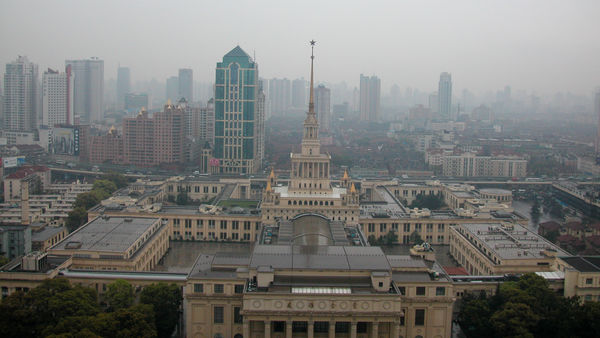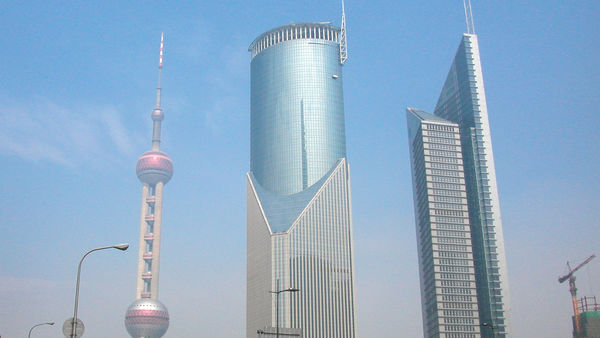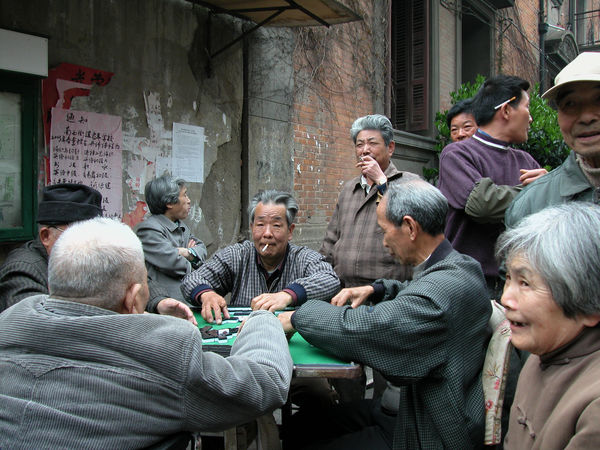Sky-Scraping Shanghai
By Rick Steves
From my 22nd floor hotel room window I look out at a slender spire towering over a Greek-temple wedding-cake building. It's crowned by a single bold star. Twenty years ago, it stood alone, boldly declaring "all power to the dictatorship of the people of the communist People's Republic of China." Today, like a tiny church lost in the canyons of Manhattan, it's dwarfed by a forest of skyscrapers. In Shanghai, a new religion is all the rage…capitalism.
I spent a week in Shanghai with 100 business and government leaders from Seattle on an educational trip designed to bolster cooperation and trade between our two cities.
With the help of a police escort, our two buses cut quickly through the traffic of this boomtown of 15 million (not counting its "roving population" of 3 million unofficial residents) to the future-esque National Theater. There, sitting under a gaudy sign — crinkled gold foil against a pleated red curtain — proclaiming "Greater Seattle Delegation Welcome" we listened to city big shots while being served a lavish dinner. The menu, printed especially for the occasion, was a grid of Chinese characters 5 rows high and 12 rows wide. Only with the arrival of the sixth course did I learn we were just half way through the meal.
The world's boomtown was in sales-pitch gear as we enjoyed a week-long series of meetings and roundtables exploring ways Seattle and Shanghai might collaborate. Clinking glasses at each meal to spring blossoms and "friendships of a thousand years," this trans-Pacific networking seemed as flowery as it was constructive. Our group of Seattle movers and shakers was struck mostly by how Shanghai was doing the moving and shaking.
Even as they walked us through the "Humble Administrator's Garden" — a classical garden named five centuries ago for an uncharacteristically corruption-free governor — our hosts had an amazing bravado. Their dot-com confidence had some of us musing that "only those who attempt the absurd can accomplish the impossible" — and others pondering a collapse leaving a nightmare of 80-story tall shanty towns.
The mighty Yangtze River empties into the Pacific at Shanghai. How does this city relate economically to the rest of China? "It's as if the Mississippi flowed from west to east, draining America's economy into New York City."
Shanghai is an anomaly in this vast land. As if the topsoil is fertilized by the sweat and dreams of a billion peasants, skyscrapers spring like stilettos out of the earth. Shanghai has built two thousand buildings over 100 meters tall in the last decade. With the help of what they claim is 17 percent of the world's cranes, they are throwing up office space at the rate of one Columbia Tower every two or three days.
With a trading heritage (from its days as a European colony) unrivaled in China, Shanghai has long been the country's economic engine. In the old days of Communism, Shanghai — considered an evil place — was kept down. Then, in the 1980s, the lid was lifted, and 90 percent of its income was used to subsidize a hungry People's Republic of China. Later, president Deng Xiaoping embarked upon a radical version of Reagan's trickle down economics — the money would trickle from rich to poor — but between regions rather than classes. Shanghai would be given the freedom to grow richer even exacerbating the gap between the Chinese coastal region and the rice paddy interior in hopes that that wealth would seep west. Today rather than 10 percent, Shanghai keeps 40 percent of its profit — enough to keep its engines stoked. With just 1 percent of China's 1.3 billion population, it produces 8 percent of its economy.
For the traveler, Shanghai is part Manhattan, part Moscow, and part teeming village. The pride of the town is its skyscrapers. Like a Jetsons world, the creative shapes are extravagant and — hopefully — will have a timeless elegance. Lots of energy is invested in fancy lighting and colorful light shows that dance nightly on many of the buildings. Then, each evening at 10:30, they go dark, and the city's architectural chorus line stands like ghosts — heads disappearing into the smog.
Taxis are uniformly polite and fair, taking you anywhere in town for about a dollar. Toilets are called Happy Rooms. Restaurants specializing in duck serve "everything but the quack." Two-story slums sprawl — seeming to clutch bits of traditional life while awaiting the bulldozer.
Thankfully for my weary sightseeing muscles, one bit of old world elegance the bull dozers have spared is the traditional massage. My massage was served up by a muscular doll of a masseuse who played me like a drum and strung me like a bow. As I paid her $10 for the hour, I had the distinct feeling we each figured we were ripping the other one off.
You need to get things written in Chinese to communicate in this land where the language barrier is as formidable as the skyscrapers. In the market, a tea merchant displayed leaves varying in price from $.50 to $100 per kilo. I asked about the best and she scribbled the local characters for "dragon well tea" into my notepad. Later, stepping past an incense-filled temple into a traditional teahouse, I showed my scrap of paper. For the price of my daily latte back home — a ransom here — I enjoyed the best tea in the house (which tasted pretty unexceptional to me).
Much of China's historic charm and physical heritage was destroyed by Mao Tse Tung's Cultural Revolution — a violent purging of anything not in line with his revolutionary ideals from 1966 to 1976. Much of what Mao missed has been bulldozed in the last decade by the building explosion. The problem is exacerbated by Shanghai's insistence on being modern and western. When I asked about traditional music, both the hotel and the tourist office proposed jazz. When pressed for traditional Chinese music, they explained that would drive local customers away.
The only shows in town were a performance of Cats at the National Theater, the Peace Hotel Jazz band — famous for its ability to play stiff as if Louis Armstrong never existed— and a nerve-wreckingly good acrobatics show.
China has come a long way...but it's far from free. Government leaders are selected rather than elected. Guards and police are posted everywhere. Signs explain the seriousness of "deviant behavior." I could make a cop appear from nowhere simply by sitting on the sidewalk.
People seem docile and resigned to follow the rules. Schoolteachers carry bullhorns. Workers don't organize. Cabbies give you back all the change. Perhaps this comes from being part of an unprecedented stability and prosperity. Or maybe the Confucian philosophy of a societal hierarchy lends itself to an acceptance of an economic order based not on democracy but on a corporation. (Even in America — so proud of its freedom — members of a corporation are ruled by unelected directors in order for the corporation to effectively do what it is designed to do.) China feels like one big corporation.
China's corporate goal: to overcome the backward state — the mess Mao left — as quickly and thoroughly as possible...regardless of the cost. Anything, other than the government, with the potential to organize the masses is forbidden. That's why a simple religion like Falun Gong was decapitated and crushed. Chinese MTV is as racy as a mouseketeer jam session with perky Asian heartthrobs singing love lite. But every hour or so a stirring music video produced by the military turns the mic over to seas of soldiers singing anthems in formation while powerful images of the heroic Chinese army roots out and beats down all possible foes.
Apart from portraits of a dashing young Mao on the paper money and a smattering of newly made Mao pins, little red books, and posters that only look old, there's little physical evidence of the horrific years of the Cultural Revolution. Just as Germans simply didn't talk about Hitler until the 1990s, Chinese conveniently bury their Mao baggage.
This city thrives on deadlines and big events to force progress. Electronic reader boards are already counting down the days until Expo 2010 opens in Shanghai. The government, with a top-down efficiency unencumbered by the niceties of democracy, builds the infrastructure (ports, airports, highways, and so on) in order to let capitalism really sprint. It's the government — rather than the stock market — that incubates new businesses and technologies. While Europeans brag about taking time off, Chinese brag about working long and hard. Members of the Seattle trade delegation (frustrated with the slow pace of change in American cities) were struck — even envious — of how the Chinese talk with clear "move on" words. Americans say, "we'll explore that idea." In today's China, snipers on the sidelines are allowed no bullets.
The economy rages like a class of teenage boys just given hot cars and told the police are on holiday. China makes Japan seem to have soul. Because of its late start, Shanghai can leap-frog technologies (e.g. go direct to wireless) and because of its system of government, labor and environmental concerns are barely road turtles. The Chinese are actually striving for more chain stores and celebrating a brisk increase in the number of lawyers. As Mao's cultural revolution was folding up shop, senior officers in the military were given employment as ripe-for-corruption judges. The deep-seated Chinese tradition of "emulate the masters" in the arts survives today in its pre-disposition to ignore intellectual property rights. From videos and CDs to Microsoft programs, piracy has been the norm. Shanghai businesses — realizing this problem will hamper their ability to interface with a thriving world — have pledged to use only licensed software.
Historically, merchants were low and scholar/bureaucrats were high in the Confucian social hierarchy. Today, a new generation of business and political leaders — many only in their 30s — is working together (free from traditional class hang-ups and the messiness of democracy) to usher in a bold new age.
To witness all this change as a tourist — even without the royal welcome of a trade delegation — is a thrilling experience. While Shanghai is certainly not representative of China, it is representative of where China wants to go.
Rick traveled to Shanghai with the Greater Seattle Trade Delegation in early April 2003. Did Rick find it an interesting place to visit? Yes. Will Rick be doing more on China? No.




